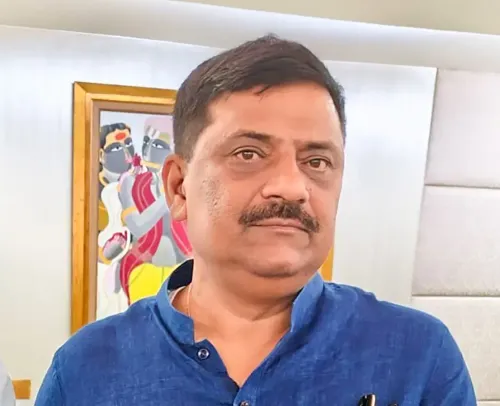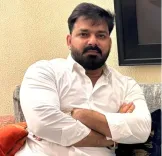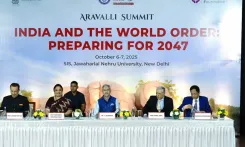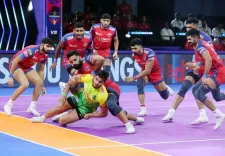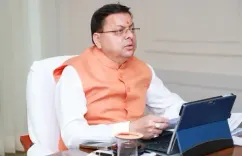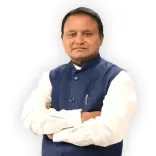What Does the Surrender of a Key Accused in the Deva Pardhi Custodial Death Case Mean?
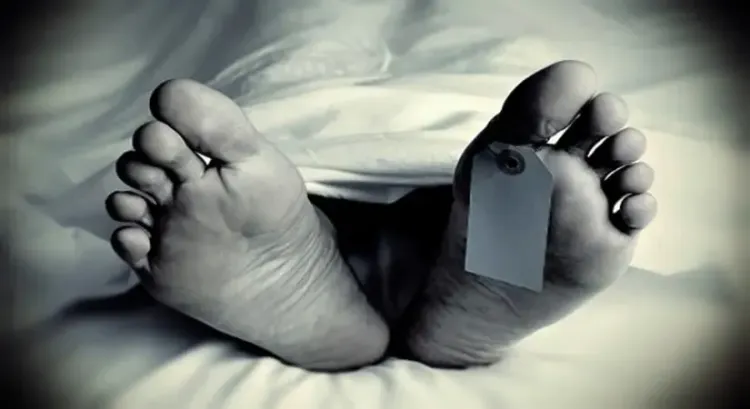
Synopsis
Key Takeaways
- Deva Pardhi's case highlights systemic police violence.
- Surrender of accused officers may signal accountability.
- The Supreme Court's involvement is crucial for justice.
- Community outrage reflects broader issues of Adivasi rights.
- Calls for reform in police practices are urgent.
Bhopal, Oct 6 (NationPress) In a remarkable development emphasizing the Supreme Court's relentless demand for accountability in cases of custodial violence, one of the two main police officers implicated in the heart-wrenching demise of 26-year-old Deva Pardhi has voluntarily surrendered to law enforcement in Madhya Pradesh, just hours ahead of the court's self-imposed arrest deadline set for October 7.
This significant event occurs against a backdrop of escalating judicial oversight and may avert a high-stakes contempt hearing scheduled for the following day.
Town Inspector (TI) Sanjeet Singh Mawai, who had evaded authorities for over a year, presented himself at the Badarwas police station in Shivpuri district late on Sunday night, effectively concluding a prolonged manhunt that had drawn severe criticism from the nation’s highest court.
This surrender follows the recent capture of his co-accused, Assistant Sub-Inspector (ASI) Uttam Singh, who was apprehended by the Central Bureau of Investigation (CBI) in Indore just over a week earlier.
Mawai’s decision to turn himself in is perceived as a direct reaction to the Supreme Court's October 7 ultimatum, potentially shielding senior officials—including the state Chief Secretary—from being summoned to court for non-compliance with the court's directives.
The case has become a glaring representation of police impunity and the dangers faced by marginalized communities in custody, originating in the dusty streets of Guna district, Madhya Pradesh, on July 15, 2024.
Deva Pardhi, a young tribal individual from the nomadic Pardhi community, was preparing for what should have been a joyous occasion—his traditional wedding procession to his bride's village.
Clad in his wedding attire, Deva and his uncle, Gangaram Pardhi, were forcibly taken in a vehicle—a tractor and trolley designated for the 'baraat.' The police detained them under the guise of routine questioning regarding a petty theft case involving ₹8 lakh stolen from the nearby Bhidra village.
Tragically, the very vehicle meant to transport the wedding party was repurposed by the police to take the two men to Myana Police Station, transforming a day of celebration into one of profound sorrow.
Hours later, the bridegroom Deva was confirmed dead, throwing the community into mourning.
The official account from the Madhya Pradesh Police described a sudden incident—a fatal cardiac arrest while in custody. However, Deva's family, devastated and doubtful, accused the officers of severe torture.
Autopsy reports and testimonies from Gangaram, who survived the ordeal, depicted a harrowing scenario of beatings, electric shocks, and relentless interrogation tactics intended to extract confessions for crimes they were not connected to.
The immediate aftermath was intense and tragic. Deva's distraught bride, unable to cope with her loss, attempted suicide by self-immolation outside the police station, only to be rushed to Guna District Hospital along with other grieving relatives who tried to follow her lead.
Protests erupted throughout the region, with tribal rights advocates condemning the incident as yet another example of systemic violence against Adivasi communities, whose members are frequently stereotyped as habitual offenders and subjected to extrajudicial abuses.
The family's urgent demand for justice reached the Supreme Court, where a petition revealed glaring deficiencies in the initial Magisterial inquiry ordered by the state government—a probe that critics deemed a cover-up.
On May 15, 2025, a crucial Bench led by Justice B.V. Nagarathna delivered a stern critique of the local police's handling of the investigation.
Pointing to evidence of tampering, witness intimidation, and deliberate concealment, the court transferred the investigation to the CBI and issued an unequivocal directive: "The police officials deemed responsible for the custodial death must be arrested without delay and no later than one month."
This order transcended mere procedural necessity; it served as a powerful declaration against the "blue wall of silence" that protects rogue officers, underscoring that custodial deaths undermine the very essence of constitutional rights as enshrined in Article 21.
However, as weeks turned into months, compliance remained elusive. By September 2025, with neither Mawai nor Uttam Singh in custody despite their suspension on September 24—four months after they allegedly went into hiding—the victim's mother filed a contempt petition.
The plea accused the CBI and the Madhya Pradesh government of willful defiance, claiming a nexus that allowed the accused to remain at large while still receiving salaries and even filing anticipatory bail applications.
The Supreme Court hearings in late September unfolded with dramatic intensity. On September 23, the Bench of Justices Nagarathna and R Mahadevan—renowned for their unwavering stance on human rights violations—did not hold back.
"More than four months have elapsed, and the court's directives have not been adhered to. It appears that you are shielding the officers," the Bench admonished the state’s counsel.
Justice Nagarathna probed further: "You were included as a party in the (May 15) order. This constitutes contempt of the Supreme Court's order by the State government. How can the State justify paying salaries to individuals who were ordered to be arrested?"
Additional Solicitor General (ASG) K.M. Natraj, representing the CBI, along with Aishwarya Bhati for the state, faced a relentless barrage of inquiries.
ASG Raja Thakare detailed the agency's extensive efforts including physical surveillance, tracking financial transactions, monitoring toll plaza vehicles, scrutinizing social media, and raiding known hideouts. The CBI even raised the stakes with a ₹2 lakh reward per head for credible information, announced on September 24. However, the Bench remained unimpressed.
"What does this signify? This is just a facade," Justice Nagarathna retorted, dismissing the actions as superficial.
Justice Mahadevan also expressed frustration, stating, "You are part of the State administration. In the event of a serious crime, how can you absolve yourselves of responsibility? You are conspiring to protect the officers who were ordered for arrest. How can they dare to file anticipatory bail applications against a Supreme Court order?"
The court's frustration culminated with allegations of "aggravated contempt," warning of summoning the CBI Director, the Madhya Pradesh Chief Secretary, and the Additional Superintendent of Police overseeing the investigation.
"Your impotence masquerades as protection," Justice Nagarathna noted, dismissing claims of operational hurdles. In an effort to compel the system to act against the police, the Bench set a stringent deadline: arrests must be made by October 7, or the Investigating Officer and the Additional Chief Secretary of the Home Department would be personally summoned on October 8.
The case was scheduled for further hearings on September 26. On that date, ASI Uttam Singh, 42, was taken into custody in Indore after surrendering at a special CBI court. Sources indicated he had been hiding in the city, relying on a network of supporters, but the reward announcement and heightened surveillance compelled his surrender.
Interrogations revealed initial leads on Mawai's whereabouts, including obscure social media posts indicating his distress over the growing pressure.
By October 5, intelligence pointed to Shivpuri as his likely location, leading to his pre-dawn surrender. "He arrived quietly, citing familial pressure and fear of escalation," a senior Shivpuri police official informed reporters, adding that Mawai was promptly handed over to the CBI for custody remand.
Both officers now face charges under Sections 302 (murder), 330 (causing hurt to extract confession), and 193 (fabricating false evidence) of the IPC, in addition to provisions of the SC/ST (Prevention of Atrocities) Act.
In a parallel development, Guna police on October 5 apprehended dismissed Sub-Inspector Ramveer Singh Kushwaha, who had evaded arrest for over two and a half years.
Kushwaha is accused of witness tampering in the 2022 murder of Atmaram Pardhi—thought to be a relative of Deva—another case enshrouded in controversy and stalled investigations.
Despite securing bail in the murder charge from the Madhya Pradesh High Court, his anticipatory bail in the intimidation case was still pending. Acting on social media surveillance revealing Kushwaha rallying supporters in Guna, Superintendent of Police Ankit Soni dispatched a specialized team that swooped in on Sunday night.
"This showcases our zero tolerance for those obstructing justice," Soni stated, linking the arrest to broader initiatives following the Supreme Court's scrutiny in Guna.
The Guna cluster of cases—encompassing Deva's death, Atmaram's unresolved murder, and the eight-year disappearance of Geeta (a potential witness in related matters)—highlights a disturbing trend.
Activists highlight the Pardhi community's vulnerability, frequently targeted under harsh anti-nomadic laws, with custodial deaths in Madhya Pradesh rising to 15 percent in 2024 according to NCRB statistics.
As Deva's mother, who has led an unyielding campaign from her humble Bilakhedi home, awaits the October 8 hearing, a glimmer of hope pierces through the sorrow.


